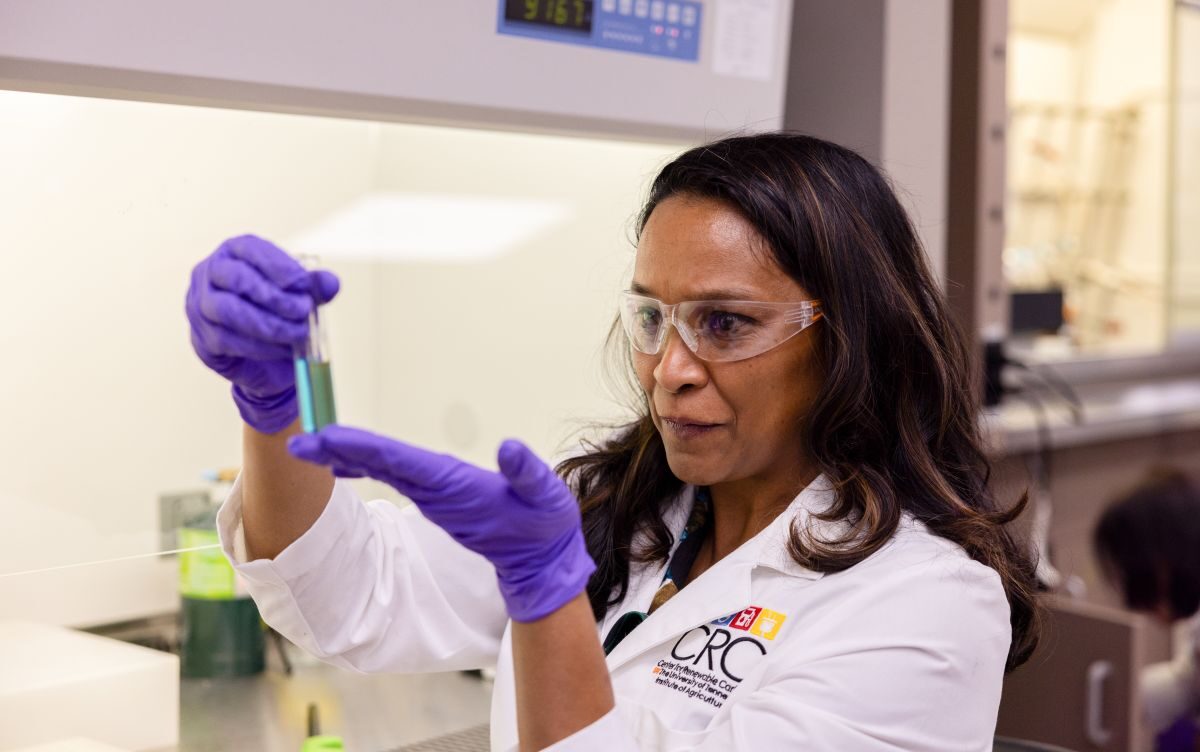
Proposed Circular Bioeconomy System Could Bring Profound Advancements to Region
KNOXVILLE, Tenn. — Industry, farmers and consumers across Tennessee, Alabama and the Southeast are one step closer to employing a new economic engine based on locally grown crops and new biobased industrial materials. On September 18, the National Science Foundation announced that the BRIDGES proposal developed by HudsonAlpha Institute for Biotechnology in collaboration with University of Tennessee, Knoxville, and Auburn University, had reached the final stage of competition in the Regional Innovations Engines Program and remains under consideration for an award totaling up to $160 million.
The BRIDGES proposal is one of 15 proposals that has advanced from an original pool of nearly 300 teams. The NSF’s goal is to create economic, societal and technological opportunities for various regions across the nation. The original pool of submissions totaled nearly 300 teams.
BRIDGES stands for Biobased Rural Innovation for Domestic Growth & Economic Security. It models a shift in the regional economy that benefits industry, farmers and consumers by eliminating industry reliance on petroleum as well as fibers and chemicals. BRIDGES scientists will focus on developing a circular bioeconomy in the southeastern United States by converting perennial agricultural grass crops into consumer goods in the packaging, automotive and construction materials industries.
“The NSF Engines program creates economic and technological opportunities in regions across the country, and BRIDGES is a visionary project that can lead to transformational impact,” said Chancellor Donde Plowman. “We celebrate the team’s advancement to the next stage of competition and the potential for innovation-based economic development in Tennessee and beyond.”
Nicole Labbé, Charles E. Wharton Institute Professor and director of the UT Center for Renewable Carbon in the UT Institute of Agriculture (UTIA), is one of the co-principal investigators for BRIDGES. She says the innovation engine will address key technical hurdles in matching the needs of industry and regional farmers. UT will focus on deconstructing the plant materials and developing recyclable materials, especially for the automotive industry, that will ultimately make the whole circular bioeconomy system, or CBS, feasible and profitable. The effort will produce needed products while developing the region’s workforce. It will also benefit farmers as the grass crops used can be grown on underutilized and marginal lands.
“UT and the BRIDGES Engine partners are already working with regional manufacturers to address the workforce development and training components of the BRIDGES Engine. We are addressing the challenges related to expanding the skills and knowledge base of rural workers along with expanding the opportunities for high-skill, high-pay jobs in rural areas,” Labbé explains. Earlier this month the Center for Renewable Carbon and UT AgResearch hosted the Bioderived Materials and Chemicals in Circular Bioeconomy Systems Conference, which explored the links between research, education and supporting industries that will be key to developing a circular bioeconomy system across the region
“UTIA is excited to work with HudsonAlpha and Auburn University on this CBS endeavor,” said Keith Carver, senior vice chancellor and senior vice president of UTIA. “The research, teaching and outreach mission of UT and Auburn, both land-grant universities, aligns perfectly with the goals of the economic engine. Together, we can make this a positive, transformative change for the region.”
In addition to HudsonAlpha and co-leads UT and Auburn, the BRIDGES team includes a growing list of research institutions, industry leaders, educators and economists, each bringing their unique expertise to the effort. Among the central members of the coalition are Volkswagen and AGgrow Tech. A list of organizations partnering with the BRIDGES Engine is available at the engine website: bridgesengine.org.
“Moving forward to the final round in the competition is a recognition of the dedication and innovation of the team behind BRIDGES, a coalition of more than 80 partners across industry, academia, and communities,” said Sam Jackson, HudsonAlpha’s director for the BRIDGES Engine. “NSF recognizes the strength of the plans we have proposed to drive lasting economic development across rural Alabama and Tennessee.”
“The BRIDGES Engine is a tremendous opportunity to further strengthen our rural economies by focusing the latest technological advancements from agricultural and manufacturing sectors to benefit critically important industries in the region,” said Steve Taylor, Auburn University senior vice president for research and economic development.
To learn more, visit the project’s website, bridgesengine.org.
During the next and final stage of proposal review, NSF will conduct in-depth site visits to assess risks, resources and each team’s ability to adapt to changing circumstances. The role of the NSF Engines applicants’ partners will be key to determining the final awards. NSF anticipates announcing the NSF Engines awards resulting from the current competition in early 2026.
About UTIA
The University of Tennessee Institute of Agriculture is comprised of the Herbert College of Agriculture, UT College of Veterinary Medicine, UT AgResearch and UT Extension. Through its land-grant mission of teaching, research and outreach, the Institute touches lives and provides Real. Life. Solutions. to Tennesseans and beyond. utia.tennessee.edu.
About HudsonAlpha Institute for Biotechnology
HudsonAlpha Institute for Biotechnology is a nonprofit organization dedicated to improving the human condition around the globe through discovery, education, and economic development in the genomic sciences. HudsonAlpha’s mission is to develop and apply scientific advances to health, agriculture, education and commercialization. The campus includes nearly 50 biotech companies and consists of 152 acres located within Cummings Research Park, the second-largest research park in the nation. To learn more about HudsonAlpha, visit hudsonalpha.org.
About NSF Regional Innovation Engines
Launched by NSF TIP, the NSF Engines program is building and scaling regional innovation ecosystems nationwide. Each NSF Engine is powered by a broad coalition of private sector, regional and scientific leaders and organizations to accelerate breakthrough emerging technology R&D that drives growth and ultimately bolsters U.S. economic competitiveness and national security.
See also: UT Knoxille News and HudsonAlpha announcement.